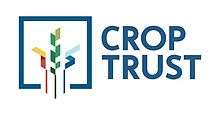Crop Trust
The Crop Trust, officially known as the Global Crop Diversity Trust, is an international nonprofit organization which works to preserve crop diversity in order to protect global food security. It was established through a partnership between the United Nations Food and Agriculture Organization and CGIAR acting through Bioversity International.[1]
 | |
| Founded | 2004 |
|---|---|
| Type | Non-profit NGO |
| Focus | Biodiversity activism |
| Headquarters | Bonn, Germany |
Area served | Worldwide |
| Product | Non profit crop diversity advocacy |
Key people | Åslaug Haga (Executive Director) |
| Website | croptrust.org |
Overview
In 2006, the Crop Trust entered into an agreement with the governing body of the International Treaty on Plant Genetic Resources for Food and Agriculture. The agreement recognises the Crop Trust as an "essential element" of the treaty's funding strategy in regards to the ex situ conservation and availability of plant genetic resources for food and agriculture. It also confirms the autonomy of the Crop Trust as a scientific organization in raising and disbursing funds.
The Crop Trust is assembling an endowment fund, the income from which will be used to support the conservation of distinct and important crop diversity, in perpetuity, through existing institutions.[2] Crop diversity is the biological foundation of agriculture, and is the raw material plant breeders and farmers use to adapt crop varieties to pests and diseases. In the future, this crop diversity will play a central role in helping agriculture adjust to climate change and adapt to water and energy constraints.
Management
The Crop Trust has its offices in Bonn, Germany, after relocating there from Rome, Italy. The executive board is chaired by Tim Fischer (Australia). The Crop Trust Trust also has a Donors' Council, chaired by Jaap Satter (Netherlands). As of May 2016 the organization had raised approximately US$300 million for its endowment.[2] Main donors include: Australia, Canada, Germany, Ireland, Norway, Sweden, Switzerland, United Kingdom, United States, the Bill and Melinda Gates Foundation, and the Grains Research and Development Corporation (Australia). A number of developing countries have also provided support, including Egypt, Ethiopia and India. Further contributions have been received from private corporations, foundations, industry associations, and from private individuals.
Åslaug Haga, a Norwegian politician who was chairperson of the Centre Party from 2003 to 2008, took over as executive director from Cary Fowler in 2013.
Grants
Since its establishment, the Crop Trust has funded work in over 80 countries, and made its first grant for long-term conservation of a collection in late 2006.[3] By 2011, the Crop Trust had established in-perpetuity support (i.e. grants funded through the Crop Trust's endowment) for collections of 15 crops: rice, cassava, wheat, barley, faba bean, pearl millet, maize, forages, banana, aroids, grass pea, sorghum, yam and lentil.
In 2007, the Crop Trust began a global initiative to rescue threatened, high-priority collections of crop diversity in developing countries and to support information systems to improve their conservation and availability.[4] These efforts included providing support to developing countries and international agricultural research centers to deposit shipments of seed samples in the Svalbard Global Seed Vault for safety duplication purposes.
In 2010, the Crop Trust launched a global 10-year program to find, gather, catalog and save the wild relatives of 22 major food crops.[5] These wild species contain untapped diversity to help address future challenges to agriculture.
Svalbard Global Seed Vault
The Crop Trust joined the Government of Norway and the Nordic Gene Bank in the 2008 establishment of the Svalbard Global Seed Vault, a "fail-safe" facility located at Svalbard, Norway.[6] This facility provides a safety back-up for existing genebank collections, which are vulnerable to war, civil strife, natural disasters and several identified alien species. The Vault has also been touted as providing a means for restoring agriculture in the event of a global catastrophe.[7] It is designed to hold the seeds of some 4.5 million samples of different varieties of agricultural crops.[8]
References
- "Crop Trust to conserve plant diversity". www.fao.org. Retrieved 2017-02-26.
- "The Crop Trust Raises $300m of $850m Target to Safeguard Global Biodiversity - AgFunderNews". AgFunderNews. 2016-05-17. Retrieved 2017-02-26.
- SciDev.Net. "'Indefinite funding' safeguards biodiversity of rice". SciDev.Net. Retrieved 2017-02-26.
- Revkin, Andrew C. (2007-04-19). "Global Effort to Save Endangered Crops Gets $37.5 Million Infusion". The New York Times. ISSN 0362-4331. Retrieved 2017-02-26.
- "BBC - Earth News - Wild food crop relatives to be 'rescued'". news.bbc.co.uk. Retrieved 2017-02-26.
- "Best Inventions of 2008 - #6. The Global Seed Vault". Time. 2008-10-29. ISSN 0040-781X. Retrieved 2017-03-09.
- Walsh, Bryan (2009-02-27). "The Planet's Ultimate Backup Plan: Svalbard". Time. ISSN 0040-781X. Retrieved 2017-03-09.
- "'Doomsday' seeds arrive in Norway". news.bbc.co.uk. Retrieved 2017-03-09.
External links
- Crop Trust website
- Vimeo.com: "Securing Our Food Forever" — Crop Trust video.